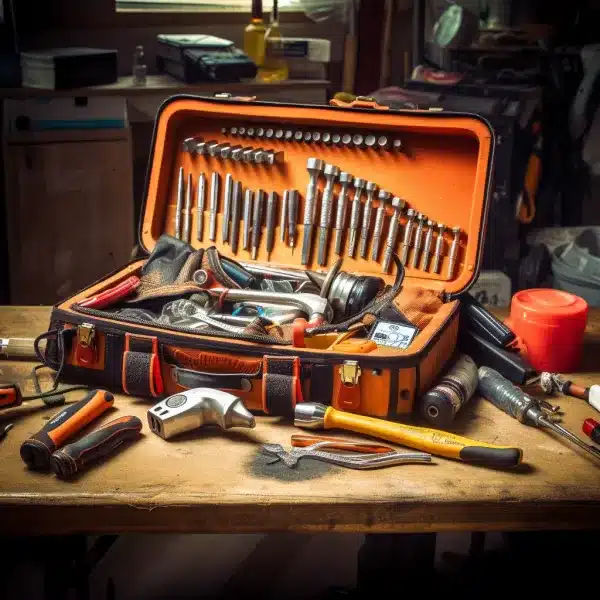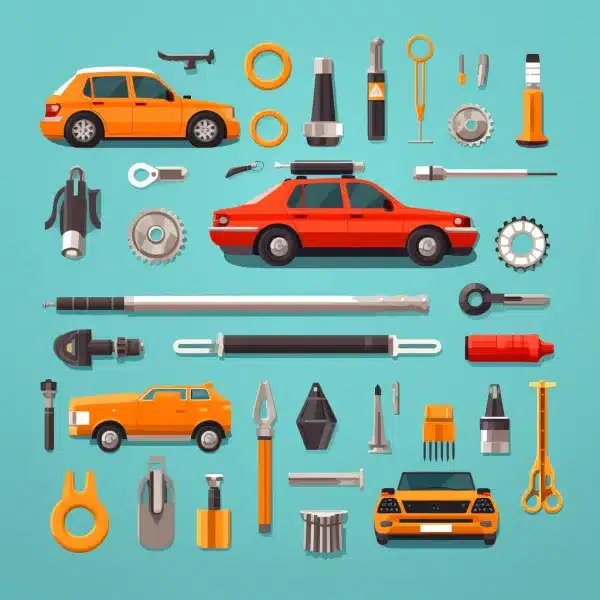
Essential Car Maintenance Tools: DIY Enthusiast’s Guide
Essential Car Maintenance Tools Vehicle Care: As an automotive enthusiast, I understand the importance of having the right tools for car maintenance. Whether you’re a DIY enthusiast or an aspiring auto mechanic, having the essential tools on hand is crucial for preventative vehicle care and ensuring your vehicle stays in peak condition.

Key Takeaways:
- Investing in car maintenance tools is essential for DIY enthusiasts and aspiring auto mechanics.
- Having the right tools allows for preventative vehicle care and ensures your vehicle stays in top shape.
- Essential tools for car maintenance include air compressors, car jacks, flashlights, funnels, hammers, and wrenches.
- Community colleges and trade schools often require students to purchase auto mechanic tools before starting their program.
- By owning these tools, you can elevate your DIY skills and perform regular maintenance tasks such as oil changes, air filter replacements, and tire pressure checks.
The Importance of Changing Oil: Engine Health 101
Regularly changing the oil in your car is essential for maintaining engine health and prolonging the life of your vehicle. Not only does it save you money on frequent mechanic visits, but it also ensures that your engine runs smoothly and efficiently.
To perform an oil change, you’ll need a few tools, including a wrench, oil filter wrench, oil drain pan, and a funnel. These tools enable you to safely and effectively remove the old oil and replace it with fresh, clean oil. By removing the old oil, you eliminate any contaminants that can negatively impact engine performance.
By staying on top of regular oil changes, you can prevent harmful sludge build-up in your engine, maintain optimal lubrication of moving parts, and reduce the risk of engine damage or failure. It’s recommended to follow your car manufacturer’s guidelines for oil change intervals to ensure you’re giving your engine the care it needs.
Regular oil changes are like a spa treatment for your car’s engine, keeping it healthy and rejuvenated.
The Benefits of Regular Oil Changes
- Improved engine performance and efficiency
- Enhanced fuel economy
- Reduced engine wear and tear
- Extended engine lifespan
- Prevention of expensive repairs
Table: Recommended Oil Change Intervals
| Driving Conditions | Recommended Oil Change Interval |
|---|---|
| Normal driving conditions | Every 5,000 to 7,500 miles |
| Severe driving conditions (extreme temperatures, dusty roads, frequent stop-and-go traffic) | Every 3,000 to 5,000 miles |
| High-performance vehicles | Every 3,000 to 5,000 miles |
Regular oil changes are a simple but crucial part of car maintenance that can significantly impact the health and performance of your engine. By prioritizing this routine maintenance task, you’ll not only save money in the long run but also enjoy a smoother, more reliable driving experience.
The Impact of Air Filter Replacement: Breathe Easy
When it comes to car maintenance, one crucial task that often gets overlooked is the replacement of the air filter. However, understanding the impact of air filter replacement is key to ensuring optimal fuel efficiency and reducing harmful emissions. Replacing the air filter allows the engine to breathe easy and operate at its peak performance, ultimately benefiting both your vehicle and the environment.
So, why is air filter replacement important? Well, over time, the air filter collects dirt, debris, and other particles from the surrounding environment. This buildup restricts the airflow to the engine, affecting its efficiency. By regularly replacing the air filter, you can prevent this blockage and ensure that clean air reaches the engine, promoting smoother combustion and better fuel efficiency.
“Regularly replacing the air filter can improve fuel efficiency by up to 10%.” – Car Maintenance Expert
Additionally, a clogged air filter can lead to increased fuel consumption and emissions. When the engine doesn’t receive enough oxygen due to a dirty air filter, it compensates by burning more fuel to maintain performance. This not only puts a dent in your wallet but also contributes to environmental pollution. By replacing the air filter as recommended by your vehicle manufacturer, you can help reduce your carbon footprint and save money on fuel in the long run.
Benefits of Air Filter Replacement:
- Improved fuel efficiency
- Reduced emissions
- Enhanced engine performance
- Longer engine life
So, don’t neglect the importance of air filter replacement in your car maintenance routine. By investing a small amount of time and effort into this task, you can breathe easy knowing that you’re taking steps to improve both your vehicle’s fuel efficiency and the environment’s well-being.
| Benefits of Air Filter Replacement | Percentage Improvement |
|---|---|
| Fuel Efficiency | Up to 10% |
| Emissions Reduction | Significant decrease |
| Engine Performance | Enhanced power |
| Engine Life | Extended lifespan |
The Importance of Tire Pressure Check: Road Safety Essential
When it comes to car maintenance, one task that should never be overlooked is checking and maintaining proper tire pressure. This simple yet crucial step is essential for both safety and cost savings. Low tire pressure can lead to tire damage, decreased fuel efficiency, and even compromise your safety on the road. By regularly checking and inflating your tires to the recommended air pressure, you can extend the life of your tires, improve your vehicle’s fuel efficiency, and enhance overall road safety.
So, what tools do you need to perform a tire pressure check? The answer is simple: a tire pressure gauge. This handy tool allows you to measure the air pressure inside your tires accurately. It’s a small investment that can have significant returns in terms of safety and savings. By regularly checking your tire pressure and ensuring it’s at the recommended level, you can prevent tire blowouts, reduce the risk of hydroplaning on wet roads, and maintain optimal traction and handling.
Why is tire pressure so important?
The importance of tire pressure cannot be overstated. Let’s consider some key reasons why this maintenance task is vital for road safety:
- Proper tire pressure ensures optimal contact between the tires and the road surface, improving traction and grip.
- Underinflated tires increase rolling resistance, resulting in reduced fuel efficiency and increased carbon emissions.
- Inadequate tire pressure can lead to uneven tire wear, compromising the performance and lifespan of the tires.
- Overinflated tires can cause a harsh and uncomfortable ride, reducing driver control and handling.
- Balanced tire pressure across all four wheels helps maintain stability and even weight distribution, especially during sudden maneuvers or emergency stops.
Regular tire pressure checks are a small effort that can make a significant difference in terms of safety, fuel efficiency, and tire longevity. By incorporating this essential car maintenance task into your routine, you can drive with confidence, knowing that your tires are in optimal condition and your vehicle is safe on the road.
| Type of Tire Pressure | Recommended Pressure (psi) |
|---|---|
| Standard Tires | 32-35 |
| Performance Tires | 35-38 |
| All-Terrain Tires | 35-40 |
| Winter Tires | 32-35 |
Conclusion
Maintaining your car is important. You can learn the skills and buy the tools to do it yourself. Doing regular tasks like changing oil, replacing air filters, and checking tire pressure helps your car run better. It also saves money and makes driving safer.
Understanding car maintenance and having the right tools is important for both auto mechanics and vehicle owners. Tools like air compressors, car jacks, flashlights, funnels, hammers, and wrenches can improve DIY skills and help with preventative care. Make car maintenance a priority to keep vehicles in optimal condition. With the right tools and proactive approach, cars can run smoothly for a safe and reliable driving experience.
FAQ
What are the essential tools for car maintenance?
Essential tools for car maintenance include an air compressor, car jacks and stands, flashlight, funnels, hammers, jumper cables, multimeter, oil drain pan, pliers, pry bar, ratchets, screwdrivers, tire gauge, vise grips, and wrenches.
How much do auto mechanic tools cost?
Beginners can expect to spend $1,000-$4,000 on tools, depending on their training program. Mechanics typically keep around $25,000-$50,000 worth of tools in their garages.
Do community colleges and trade schools require students to purchase auto mechanic tools?
Yes, community colleges and trade schools often require students to purchase auto mechanic tools before starting their program.
Why is changing the oil in your car important?
Changing the oil in your car is vital for engine health. It saves money on mechanic visits and extends the life of your vehicle.
What tools do I need to change my car’s oil?
To change your car’s oil, you will need tools such as a wrench, oil filter wrench, oil drain pan, and a funnel.
Why should I replace my car’s air filter?
Replacing your car’s air filter improves fuel efficiency and reduces emissions. It helps the engine breathe easy and operate at peak performance.
What tools do I need to replace the air filter?
To replace the air filter, you will need tools such as a screwdriver or socket wrench.
Why is tire pressure check important?
Checking and maintaining proper tire pressure is essential for both safety and cost savings. Low tire pressure can cause tire damage and reduced fuel efficiency.
What tool do I need to check tire pressure?
To check tire pressure, you will need a tire pressure gauge.
Why are regular car maintenance tasks important?
Regular car maintenance tasks like oil changes, air filter replacements, and tire pressure checks contribute to engine health, fuel efficiency, and road safety.
Why should I invest in essential car maintenance tools?
Investing in essential car maintenance tools is a wise decision for both aspiring auto mechanics and vehicle owners. It helps elevate DIY skills and preventative vehicle care knowledge.

